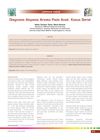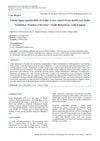 March 2024 in “Journal of Natural Remedies”
March 2024 in “Journal of Natural Remedies” An 18-year-old with hair loss saw hair regrowth after treatments combining microneedling, cupping, medication, and oil application.
 March 2024 in “Clinical, cosmetic and investigational dermatology”
March 2024 in “Clinical, cosmetic and investigational dermatology” Upadacitinib may effectively treat alopecia areata without side effects.
 February 2024 in “International Journal For Multidisciplinary Research”
February 2024 in “International Journal For Multidisciplinary Research” Nanostructured lipid carriers are effective for treating hyperpigmentation in women aged 30-40.
 February 2024 in “Curēus”
February 2024 in “Curēus” Secukinumab can cause hair loss, which may improve after stopping the medication.
 February 2024 in “PloS one”
February 2024 in “PloS one” Tofacitinib and adalimumab are promising treatments for cicatricial alopecia with few side effects.
 January 2024 in “Revista de la Asociación Colombiana de Dermatología y Cirugía Dermatológica/Revista de la Asociacion Colombiana de Dermatologia y Cirugia Dermatologica”
January 2024 in “Revista de la Asociación Colombiana de Dermatología y Cirugía Dermatológica/Revista de la Asociacion Colombiana de Dermatologia y Cirugia Dermatologica” Baricitinib successfully treated severe hair loss.

Baricitinib may effectively treat oral lichen planus.
 December 2023 in “Journal of health and rehabilitation research”
December 2023 in “Journal of health and rehabilitation research” Oral Apremilast effectively treats alopecia areata in most patients.
 November 2023 in “Research Square (Research Square)”
November 2023 in “Research Square (Research Square)” Combining calcipotriol and PRP is most effective for treating Alopecia Areata.
 October 2023 in “Dermatology practical & conceptual”
October 2023 in “Dermatology practical & conceptual” Pulse corticosteroids help regrow hair in alopecia areata but have side effects, especially betamethasone.

A rare case of a woman having both lichen planus pigmentosus and classic lichen planopilaris at the same time.
 September 2023 in “Clinical, cosmetic and investigational dermatology”
September 2023 in “Clinical, cosmetic and investigational dermatology” A new surgical method using special sutures significantly reduced wound size and prevented disease return in patients with a scarring scalp condition.
 August 2023 in “Anales de la Facultad de Ciencias Médicas”
August 2023 in “Anales de la Facultad de Ciencias Médicas” The patient with lupus and hair loss improved with oral and topical minoxidil.
 July 2023 in “Dermatology practical & conceptual”
July 2023 in “Dermatology practical & conceptual” Some lung cancer patients treated with EGFR inhibitors may develop a hair loss condition similar to folliculitis decalvans.
 July 2023 in “The Egyptian Journal of Hospital Medicine ”
July 2023 in “The Egyptian Journal of Hospital Medicine ” The conclusion is that emotional support and a variety of treatments are important for alopecia areata, but more research is needed.
 July 2023 in “The Egyptian Journal of Hospital Medicine ”
July 2023 in “The Egyptian Journal of Hospital Medicine ” Alopecia areata is a hair loss condition caused by immune factors and can be treated with JAK inhibitors.
 April 2023 in “Dermatology practical & conceptual”
April 2023 in “Dermatology practical & conceptual” Tacrolimus solution is effective and well-tolerated for treating inflammatory scalp conditions.
 April 2023 in “IP Indian journal of clinical and experimental dermatology”
April 2023 in “IP Indian journal of clinical and experimental dermatology” Lichen planus is a chronic autoimmune disease that is hard to treat and more common in women.
 March 2023 in “Journal of clinical review & case reports”
March 2023 in “Journal of clinical review & case reports” Frontal Fibrosing Alopecia mainly affects postmenopausal Mexican women, requiring early detection to prevent permanent hair loss.
 December 2022 in “Rossijskij žurnal kožnyh i veneričeskih boleznej”
December 2022 in “Rossijskij žurnal kožnyh i veneričeskih boleznej” New treatments for child hair loss due to immune issues are effective but not yet officially approved.
 July 2022 in “Singapore Medical Journal”
July 2022 in “Singapore Medical Journal” Most children with alopecia areata improved with treatment, but those with more hair loss had worse outcomes.
 July 2022 in “SKIN The Journal of Cutaneous Medicine”
July 2022 in “SKIN The Journal of Cutaneous Medicine” A new lotion with halobetasol and tazarotene successfully treats acne keloidalis nuchae.
 April 2022 in “Cermin Dunia Kedokteran”
April 2022 in “Cermin Dunia Kedokteran” Accurate diagnosis and understanding of alopecia areata in children are crucial for proper treatment.
 January 2022 in “Medical research archives”
January 2022 in “Medical research archives” Taking vitamin D might improve life for MS patients and reduce skin side effects from alemtuzumab treatment.
 November 2021 in “International journal of life science and pharma research”
November 2021 in “International journal of life science and pharma research” The new gel for psoriasis is effective, stable, and easy to apply.

Lamivudine might reverse hair graying and needs more research for potential treatments.
 April 2021 in “International Journal of Research in Dermatology”
April 2021 in “International Journal of Research in Dermatology” A child with a rare scalp condition regrew hair after treatment.

A girl with Crohn's disease developed hair loss due to her increased medication, a rare side effect seen in some children.

Alopecia Areata has no cure, treatments are limited, and the condition often recurs, but new therapies like JAK inhibitors show promise.
 March 2021 in “Clin-Alert”
March 2021 in “Clin-Alert” The FDA warned about safety issues with remdesivir and tofacitinib, finasteride is linked to suicidality, potent topical corticosteroids increase osteoporosis risk, henna can cause hemolysis in G6PD deficiency, chemotherapeutic agents can cause adverse reactions, drug interactions are common in cancer patients, ketamine can reduce at-risk drinking, high dose of anticholinergics increases dementia risk in Parkinson's patients, and prenatal exposure to second-generation antipsychotics increases pregnancy complications.






























